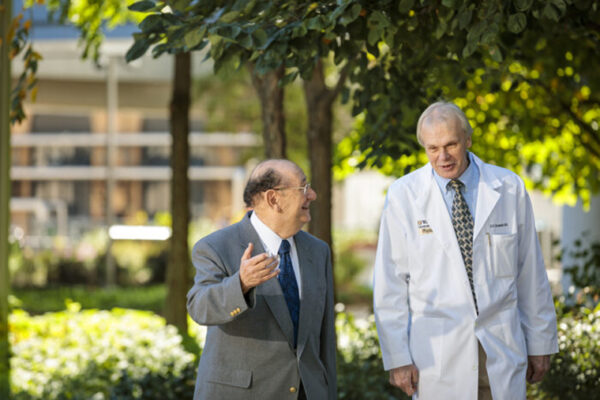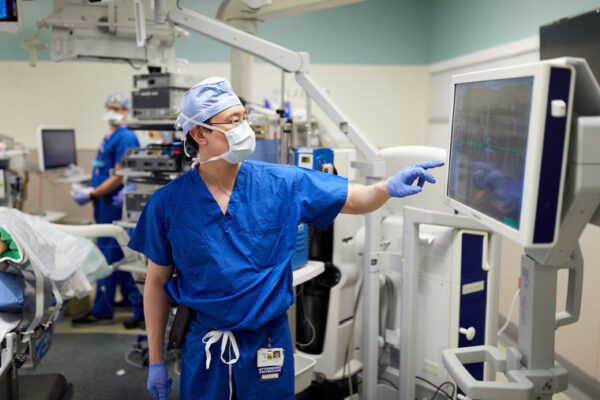Neuroscientist Steven Mennerick, a dedicated mentor and the John P. Feighner Professor of Neuropsychopharmacology at Washington University School of Medicine in St. Louis, has been named director and associate dean of the university’s Roy and Diana Vagelos Division of Biology & Biomedical Sciences (DBBS). Mennerick had been serving as the interim associate dean since December 2020 and was named to the permanent position Aug. 1 after a national search.
Mennerick also is a professor of psychiatry and of neuroscience, the division director for basic neuroscience in the Department of Psychiatry and scientific director of the Taylor Family Institute for Innovative Psychiatric Research. He studies neuronal signaling with a goal of developing novel medicines for neurological and psychiatric conditions.
“Steve has done a wonderful job in the interim role over the past 2 ½ years,” said David H. Perlmutter, MD, the George and Carol Bauer Endowed Dean of the School of Medicine, executive vice chancellor for medical affairs and the Spencer T. and Ann W. Olin Distinguished Professor. “With colleagues, he has spearheaded an innovative, interdisciplinary onboarding experience for incoming PhD students that introduces them to the challenges and rewards of creating new biosciences knowledge. He and his team have successfully grown DBBS’ student numbers by 30% and enhanced the culture of graduate education by increasing career-development opportunities for students and bolstering student organizations. I look forward to supporting him as he continues to move the division forward.”
Jointly based in the School of Medicine and in Arts & Sciences, DBBS unites life-science departments across the university to offer unparalleled training and research opportunities for undergraduate and graduate students. DBBS offers support for a growing number of undergraduate summer research and post-baccalaureate pipeline programs. It ranks as one of the best doctoral programs in the country and includes the highly respected Medical Scientist Training Program, which offers students the opportunity to earn medical and doctoral degrees simultaneously.
Graduate students can choose from 12 doctoral training programs, including cancer biology, immunology, neurosciences, computational and systems biology, and plant and microbial biosciences. Animated by the principle that the most impactful science is often achieved at the boundaries between disciplines, DBBS emphasizes breaking down academic silos and providing students with opportunities to apprentice in a wide variety of labs. More than 600 graduate students currently are training with faculty from more than 30 departments across the university.
“I am so pleased that Steve will continue to contribute his exceptional leadership and experience to DBBS,” said Feng Sheng Hu, the Richard G. Engelsmann Dean of Arts & Sciences and the Lucille P. Markey Distinguished Professor. “Much of the division’s incredible impact can be traced to its founding ideal of convergence and its focus on transdisciplinary collaboration — values echoed by the strategic vision of Arts & Sciences. Steve is committed to finding new ways to push disciplinary boundaries and to develop the pioneering scholars and research needed for biological and biomedical breakthroughs.”
As director of DBBS, Mennerick aims to create more interdisciplinary coursework; encourage the development of meta skills such as critical thinking, creative problem-solving and flexibility; and improve methods for evaluating and tracking students’ progress. He also plans to enhance the student support infrastructure to help trainees weather the inevitable failures and challenges of graduate school.
“Nature does not reveal its secrets willingly, and this can have an especially heavy emotional toll on graduate students,” Mennerick said. “We aim to support all students with innovative programming at each stage of their graduate careers, including bolstering affinity groups, offering mentorship training for DBBS-affiliated faculty and providing career-development opportunities for students interested in careers inside and outside of academia. We are serious about the advantages of enrolling students with diverse identities to foster creativity and innovation, but mindful that being a member of an underrepresented group may lead to a sense of isolation that can undermine the quality of the graduate experience if not addressed. Building appropriate support networks will enhance the graduate experience for all students and strengthen the next generation of bioscience leaders.”
DBBS also serves as a pipeline for undergrads interested in pursuing advanced degrees in the biological and medical sciences. It hosts an Amgen Scholars Program, which prepares undergraduates to apply to top-tier graduate and professional schools through an intensive summer laboratory experience, as well as new Vagelos Undergraduate Research Fellowships for current Washington University undergrads, which couple a spring course with summer laboratory research under the mentorship of Washington University faculty.
A 1995 graduate of DBBS, Mennerick studies how messages are sent between neurons and how dysfunction in this signaling can lead to mental disorders. His focus is on GABA receptors, molecules that are on the surface of neurons and play an important role in regulating emotion, cognition, pain, sleep and movement. GABA receptors have been linked to brain conditions including epilepsy, autism, depression and schizophrenia. They come in many subtypes, and Mennerick aims to understand the unique roles different subtypes play in the brain. His current work explores the advantages of chemical compounds known as neurosteroids to target certain GABA receptors as drug treatments for depression.
“I came to DBBS as a student in large part because of the flexibility of training and outstanding administrative support, and as associate dean, I continue to maintain those two goals,” Mennerick continued. “During the interim period, I have been fortunate to interact with many dedicated administrators, faculty, staff and students who have infused incredible creativity and innovation into the training model. The continued insights and ideas of the great DBBS team, along with the ongoing support from upper administration, is what keeps DBBS on the cutting edge of biosciences training.”
The division celebrated its 50th anniversary earlier this year. Founded in 1973 by P. Roy Vagelos, MD, then the head of the Department of Biological Chemistry, and then-Chancellor William H. Danforth, MD, the division pioneered a model for interdisciplinary education in the life sciences that has been widely copied. In memory of Danforth, who died in 2020 at the age of 94, Roy Vagelos and his wife, Diana Vagelos, have made a $15 million gift to the division to fund undergraduate programs and graduate student fellowships in the life sciences.



